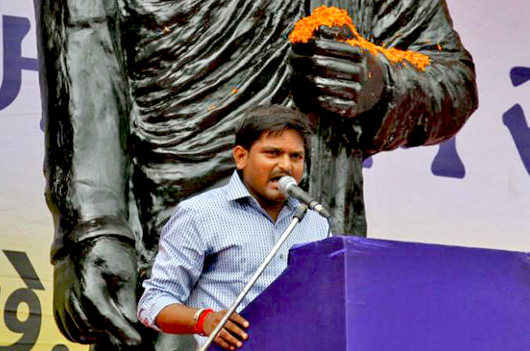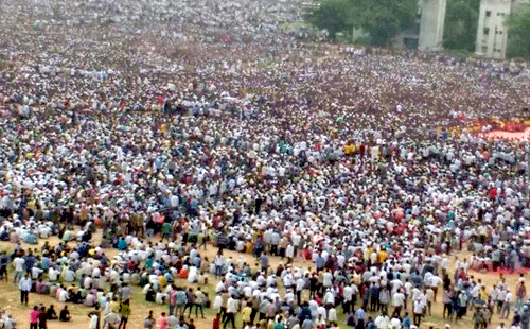Ahmedabad, Aug 25: In a mega show of strength for their demand of inclusion in OBC category for reservation, the Patel community today warned that if they are not made eligible for quota, the BJP government in Gujarat will face consequences in 2017 polls.

After the rally, the Patel community's young leader Hardik Patel, who is spearheading the agitation, said he will sit on a hunger strike at the venue till the Chief Minister (Anandiben Patel) does not come to take a memorandum from them.
The numerically and economically strong Patel community of Gujarat converged here in large numbers to take part in the rally, which brought the city to a grinding halt.
The 'Maha Kranti' rally comes after a month-long agitation by the Patel community for their demand of reservation.
"If you do not give our right (reservation), we will snatch it. Whoever will talk of interest of Patels will rule over Patels," Hardik told the gathering.
"In 1985, we had uprooted Congress from Gujarat, today there is BJP. 2017 (state election year) is coming...lotus will not bloom in the mud, it will never bloom. If you will talk about our interest then only we will nurture your lotus," he said, warning the state government.

Patels are unrelenting even though Chief Minister Anandiben Patel earlier expressed her inability to include the community in the OBC category and requested the leaders to end the agitation and come forward for negotiations. The CM had citied Supreme Court guidelines and judgements for her inability to include Patels in OBC category.
"Some parties say you do not not know about Supreme Court guidelines (of 50 per cent cap on reservations), this cannot happen. If SC can open at 3.30 in the morning for a terrorist, then why not for the youth the future of this nation?" Hardik Patel said amidst cheers from the crowd.
"If the country's youth come on the streets to demand their right and if they do not get those rights, some of them will become Naxalites, some of them will become terrorists," he said.
Addressing the rally, 22-year-old Hardik said their agitation was apolitical. "Some said your agitation is supported by Congress, some said your agitation is inspired by BJP, while some others said it is sponsored by Aam Aadmi Party, but we are apolitical," he stressed.
"We have elected representatives from Gujarat and we have sent representatives to the Centre, they are not there just to make laws or to amend the Constitution. We have sent you to serve our community...we only need our rights," he said.
He said that they expect their demand to be respected or they will "snatch" it. "One of the friends told me you have led agitation against our people (as the Chief Minister is also Patel), I replied we have started this agitation because they are our people. They should also understand we have came out with this agitation to demand for our right," he said.
Holding that the community forms a major chunk, Hardik said, "We (Patel-farming community) are not in Gujarat only... We are 1.80 crore in Gujarat..., we also have a large presence in the country."
"A person told me that you (Patels) have a political clout in Gujarat, I told him...have you just seen Gujarat don't you see Bihar...even Nitish Kumar is ours...Don't you see in Andhra Pradesh... Chandrababu Naidu is ours," he said. "In Gujarat we have six MPs, while in India we have 170 MPs...Nobody is aware of that...our seal will be there on dollars," he said.
Asserting his community's demand for OBC quota, Hardik further said, "The day when 1.80 crore Patels of Gujarat will come on the roads, then they (government) will itself come to us to offer OBC.
"This nation runs on shoulders of farmers, soldiers and labourers. If any of the three shoulders will feel pain, you will be uprooted from the power."
Bringing up the issue of farmers' suicide in his address, he said, "When we talk about farmers...6,000 farmers committed suicide in ten years...He (those who committed suicides) was our brother...Who will take responsibility for that (suicides) ...If any farmer will commit suicide in future, not only entire Gujarat, but entire India will have to bear our rage. We are not going to tolerate farmers' suicide."
Attacking the Narendra Modi government, Hardik said, "You are making 180-metre tall idol of Sardar (Statue of Unity) to take political advantage, but look inside your heart if there are still values of our Sardar Patel in it.
"We, Patels wish to be included in reserved category to fulfil the dream of Modi saheb of 'Sabka Sath Sabka Vikas'."
Hardik also said that Sardar Vallabhbhai Patel, the first Home Minister of the country, could not become the Prime Minister or else things would have been different.
Meanwhile, in view of the public gathering, major roads of the city were declared 'no go' areas by the police, resulting in quite less traffic on the roads.
The Patel community had yesterday given a call for city bandh due to which also many business establishments and schools and colleges remained closed today. The community members after the gathering took out a procession to hand over a memorandum of their demands to the District Collector.





Comments
Add new comment